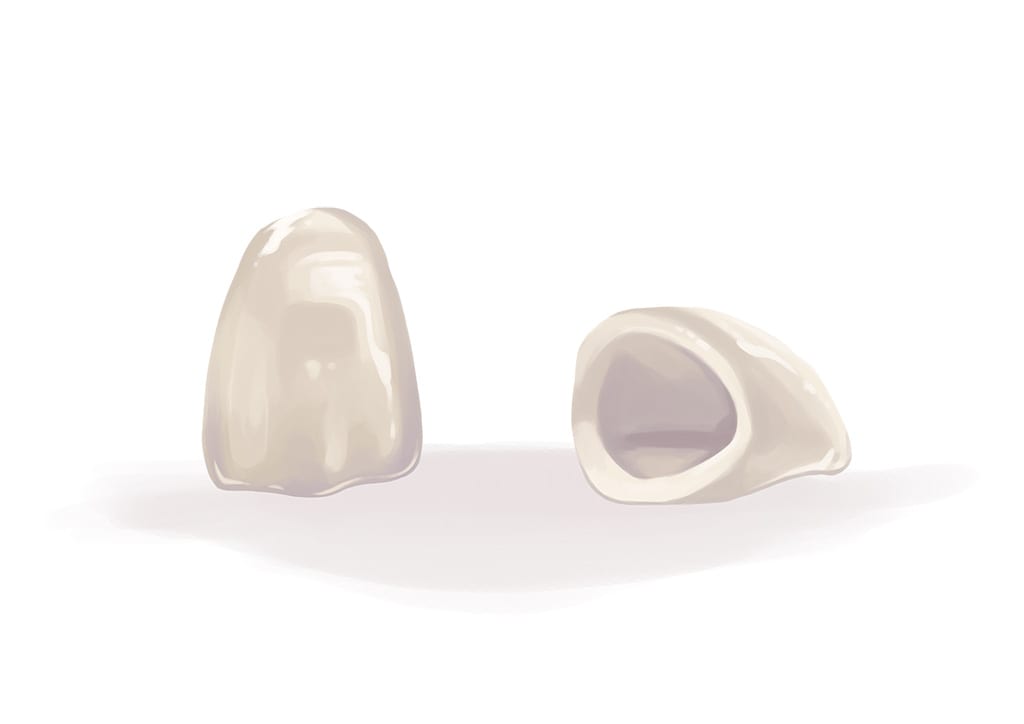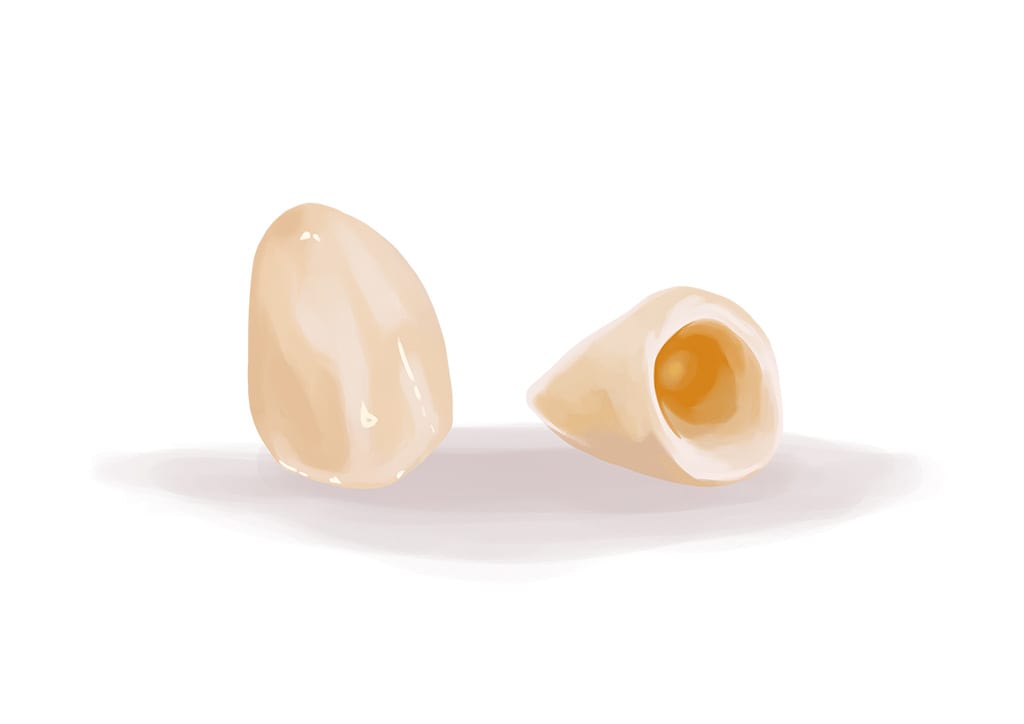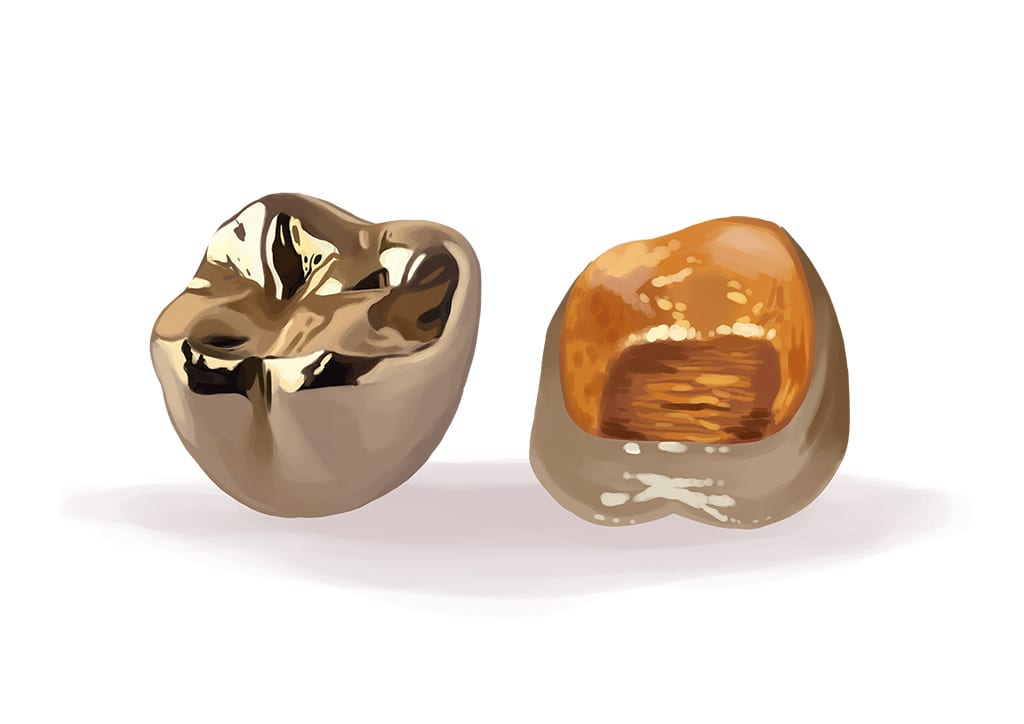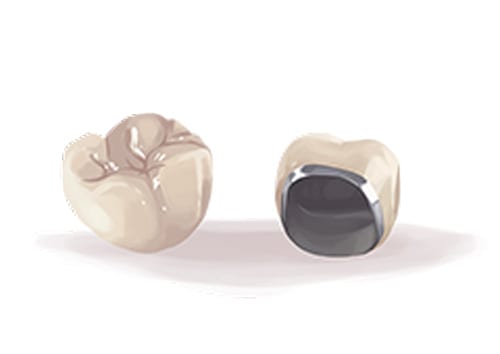Dental Crowns
The solution for damaged teeth

Dental Crown - What is it?
If your tooth is damaged, dental crowns you can get back your wonderful smile and function in your bite. Dental crowns are safe and are used as capping to protect damaged teeth. They are designed to assist you to chew, bite, look and feel like a natural tooth.
The main purpose of a crown is to protect a compromised/damaged tooth by covering it by using a customised caping. Dental crowning is a method of tooth restoration; it returns a damaged tooth back to its original size, shape and functionality. Moreover, dental crowns strengthen the tooth and/or enhances its appearance.
You may need a dental crown if:
- Your tooth has a very large cavity that cannot be repaired by filling
- You have a dental implant that requires covering
- You have a cracked, work-out or weakened tooth
- You have undergone a root canal procedure; the crown protects your restored tooth
- You need to conceal tooth discolouration or a tooth that is not well-shaped to enhance your natural smile.
Dental crowns help to restore damaged or compromised teeth by restoring the form, function and aesthetics of that tooth.
Dental Crowning Process
1. Initial Consultation
During the initial consultation, your dentist will access your teeth and oral health to determine if you are a suitable candidate for dental crowning. This is mainly done through the use of x-rays.
Based on your needs and requirements, the dentist will recommend a crown that will best suit your needs.
After which, you'll be educated on the sequence of the crowning treatment and answer any questions that you may have before beginning the treatment.
2. Crown Preparation
After receiving your confirmation to begin the dental crowning treatment, we will proceed to 'prepare' the tooth that needs to be crowned.
The preparation process reduces the size of the treated tooth by trimming it down. The tooth needs to be trimmed down in order create adequate spacing for the dental crown when placed.
This entire crown preparation process is done under local anaesthesia.
3. Impression Taking
After the treated tooth has been sufficiently trimmed, an impression of your teeth will be taken and poured into a dental mould. Based on this mould, the dentist will design a dental crown based on your needs are requirements before sending the design to a dental lab to be fabricated.
The dental crown will be made to your dentist's instructions based on the design by a team if skilled dental technicians.
While the dental crown is being manufactured, you'll be fitted with a temporary dental crown to protect the exposed treated tooth. The entire designing and fabrication process of your final dental crown should take about 1 week.
4. Fitting of Dental Crown
After we've received your dental crown from the dental laboratory. We'll book you in for a second visit for dental crown placement.
During this visit, your dentist will check the fit of your dental crown and make any necessary adjustment to the crown before permanently cementing it in place.
After this has been done, you'll be educated on dental crown care and the ways to maintain your dental crown.

Type of Dental Crowns
Dental crowns are permanent tooth caps that are made from metal, porcelain-fused-to-metal, or full-ceramic (porcelain), each dental crown is fully customised to fit the smile and bite of a person.

Metal Crown
This type of dental crowns is typically the longest-lasting type of crowns as they rarely chip or break. On top of this, they cause the least amount of wear to opposing teeth. However, due to their metallic colouring, these types of crowns best serve their purpose when they’re used on molar teeth.
Pros
- Very durable - won't chip or break easily as metal crowns are capable of withstanding the forces of biting and chewing.
- Long-lasting - can last up to 20 or 25 years as long as they're properly cared for and maintained.
Cons
- Not aesthetic at all - metal crowns are highly visible. Which is why they're usually only used for out-of-sight molar teeth.
- May not be suitable for all patients - patients with metal allergies are not suitable for metal dental crowns.

Full Ceramic/Porcelain Crown
Full ceramic or full porcelain dental crowns tend to have the best aesthetic final outcome that perfectly matches the natural colour and translucency of teeth, but these crown are not as durable as metal or porcelain-fused-to-metal crowns.
These types of crowns are a popular option when it comes to restoring front teeth.
Pros
- Highly aesthetic option - blends seamlessly with other natural teeth, providing patients with a highly discreet look.
- Avoids metal - a suitable option for patients who have certain metal allergies.
Cons
- More fragile - full ceramic or porcelain crowns are more fragile when compared to metal crowns; this does not mean that they're fragile. But they're definitely not as hardy as metal crowns.
- Not as durable - doesn't last as long as metal crowns; porcelain and ceramic crowns have to be replaced once every 15 years on average.

Porcelain-fused-to-metal Crown
These are usually colour matched to the original/natural teeth of patients. These types of crowns have a metal base that’s either fully or partially covered by ceramic or porcelain, according to the patient’s occlusions & tooth height, taking into account the function as well.
These crowns are a middle ground between full metal crowns and all-ceramic porcelain crowns as they’re more durable than all-ceramic crowns but have a higher risk of breaking and chipping when compared to full metal crowns.
Pros
- Aesthetic - blends well with natural teeth, providing patients with a discreet look.
- Durable - won't chip or break easily.
Cons
- Greyish outline near gum margins - the metallic inner shell of the crown may be visible over time along the gum margins.
- May not be suitable for all patients - patients with metal allergies are not suitable for metal dental crowns.

Zirconia Crown
Zirconia dental crowns are one of the more recent developments in dental crowning technologies. That bridges the gap between metal and porcelain dental crowns.
Zirconia crowns provide patients with a very durable and long-lasting crown that's non-metallic in nature while maintaining a highly aesthetic profile that's similar to a porcelain crown.
Pros
- Highly aesthetic option - blends seamlessly with other natural teeth, providing patients with a highly discreet look.
- Avoids metal - a suitable option for patients who have certain metal allergies
- Very durable - won't chip or break easily and are capable of withstanding the forces of biting and chewing.
- Long-lasting - can last up to 20 or 25 years as long as they're properly cared for and maintained.
Cons
- Costs more - zirconia crowns generally cost more than the other crown options.
- May damage adjacent teeth - due to the material strength of zirconia, there's a possibility that natural teeth may wear, chip or break when patients bite too hard or grind their teeth.
Cost of Crowns in Singapore
At NoFrills Dental, we pride ourselves on providing patients with high-quality dental care at affordable prices.
The average cost of a dental crown in Singapore ranges between $750 - $1,400 (before GST), depending on the complexity of the case and the material used to fabricate the dental crown.
Payment for dental crowns are typically split into 2 stages, deposit before treatment begins and a final payment once the dental crown has been permanently cemented on.
Cost of Dental Crown
$750 - $1,400+
| First Payment (Initial Consultation) |
$50 |
| Second Payment (Deposit For Dental Crown) |
$300 - $675 |
| Third Payment (Fitting of Dental Crown) |
$300 - $675 |
*All prices indicated excludes 7% GST
**Prices quoted do not include other dental treatments such as extractions, retainers, fillings and cleaning
Frequently Asked Questions
Here are some commonly asked questions about dental crowns
Do I need a dental crown?
A dental crown is typically only required when the structural integrity of a tooth has been compromised.
As such, crowning may be needed when
How long do dental crowns last?
The general lifespan of any dental crown is between 10 - 15 years. But certain dental crowns such as zirconia and full metal crowns may be able to last much longer.
The lifespan of any dental crowns is heavily reliant on how well the patient maintain the dental crown.
Is the dental crowning process painful?
The entire crowning process of a tooth should not hurt at all.
The entire procedure is done under local anaesthesia to prevent patients from feeling any pain.
Once the anaesthetic wears off, it's common for patients to feel some sensitivity to the treated tooth or experience some soreness in the gums around the tooth.
Any pain felt should be minimal and only temporary. However, if you feel excessive pain after getting your crown fitted, do contact your dentist as soon as possible to schedule an appointment.
How long is the entire process of getting a dental crown?
The entire process of getting a crown typically only requires 2 visits over the span of about 7 - 10 days.
Additional visits will only be required if there is a complication resulting from the procedure or if adjustments need to be made to the dental crown.
What are the potentials risks involved with dental crowning?
- Increased tooth sensitivity
It is common for patients to experience varying levels of sensitivity or discomfort in the crowned tooth. Especially when consuming hot/cold food or drinks. If there is excessive sensitivity or even pain in the crowned tooth, there is a possibility that the crown may have been incorrectly placed.
- Chipped crown
Dental crowns made from full porcelain or ceramic are more prone to chipping and breaking compared to other materials.
- Crown falling off
Dental crowns can become loose and fall off, this typically only occurs when there is an improper fit of the crown or if the cement has disintegrated from under the crown. Patients should consult their dentist if they feel that their crown has loosed to prevent this from occurring.
If you'd like to learn more about the potential problems that might arise from dental crowns. We have a dedicated article that dives deep into the topic.
Can dental crowns be whitened?
Traditional whitening treatments do not work on crowns, veneers, implant crowns or dentures. Whitening solutions only work on intact tooth structures and are not able to pass through any type of porcelain, metals or zirconia. We have a dedicated article that dives deep into this topic. Read more.
Schedule an appointment
We'll get back to you within 24 hours.
Other Dental Services
Here are some other services related to Dental Crowns that you might be interested in




